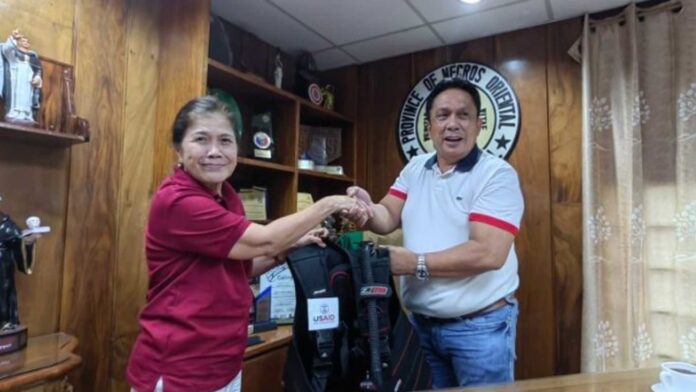The Fish Right Program of the United States Agency for International Development (USAID) is seen to reverse the depleted fishery resources in southern Negros with partners and stakeholders already empowered for the sustainability of the program even if it ends next month.
Launched in 2018 in partnership with the Philippine government through the Bureau of Fisheries and Aquatic Resources (BFAR), the Fish Right Program is implemented in three marine key biodiversity areas (MKBAs), namely, Southern Negros, the Calamianes Islands in Palawan, and the Visayas Seas.
“We are now preparing for the end of the project next month and its subsequent turnover to local partners and stakeholders in our area of coverage, and we are confident that they are now empowered to ensure its sustainability,” Dr. Hilconida Calumpong, Fish Right Southern Negros project coordinator told the Philippine News Agency Thursday evening.
Calumpong and her team turned over to Governor Roel Degamo four sets of scuba diving equipment for the province’s Environment and Natural Resources Division (ENRD) as part of the program’s capacity-building component.
She said they will facilitate the training and licensing of scuba divers from the ENRD so they can do regular monitoring of the program in southern Negros in marine protected areas and other coastal areas.
Eleven coastal municipalities and cities are covered by the program. These include Dumaguete City, Bacong, Dauin, Zamboanguita, Siaton, Sta. Catalina, Bayawan City, and Basay in Negros Oriental province and Hinobaan, Sipalay, and Cauayan in Negros Occidental, she said.
Calumpong, who is also a professor at Silliman University and former director of the SU Institute of Environmental and Marine Sciences (SU-IEMS) at the time of the project launching, said beneficiaries have been capacitated in various forms to empower them to sustain fisheries in their communities.
Silliman University, local government units (LGUs), partner stakeholders, and government agencies, such as the Department of Labor and Employment (DOLE) provide assistance such as training on gender and development, skills, livelihood, and capacity building, she said.
“These sustaining mechanisms will allow the communities to undertake their own monitoring, information management, evaluation, and management of resources,” she added.
She cited as an example groups of fishermen’s wives who produce woven doormats and pot holders that are distributed in department stores in this capital city for supplemental income during times when the fish catch is minimal due to typhoons and other reasons.
Another project to be turned over next week is the DOLE “palamigan” or ice-making project, Calumpong said.
This aims to correct post-harvest losses of the fishermen when fish are spoiled due to a lack of ice to preserve these.
Other interventions include the allocation of funds from the Negros Oriental II Electric Cooperative (NORECO II) so qualified fishers who belong to registered people’s organizations can become members of the Dumaguete Cathedral Credit Cooperative (DCCCO), Calumpong said.
As cooperative members, they can avail of short-term loans and also participate in skills training.
About 300 fishermen have already signed up as DCCCO members.
The Fish Right program has also adopted a policy to reduce illegal, unreported, and unregulated (IUUF) fishing activities, especially in municipal waters in south Negros, Calumpong said.
Municipal and commercial fishers have been organized to police their own areas as law enforcement by the police and Bantay Dagat is just a “band-aid” solution as they cannot be everywhere, she added.
Calumpong said one of the objectives of the program is for coastal communities in these MKBAs to have a “sense of ownership” so that they can actively participate in marine biodiversity conservation and protection while sustainably managing their fisheries resources that can be handed down to the next generations. (PNA)





















